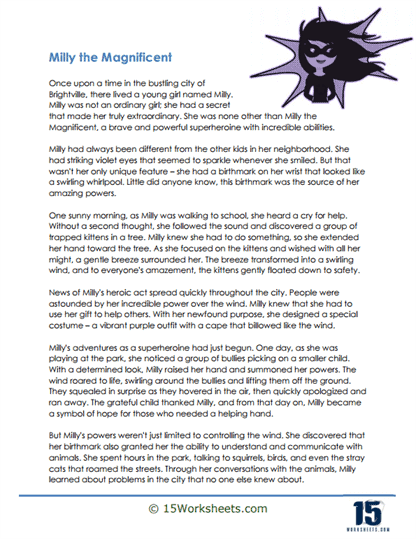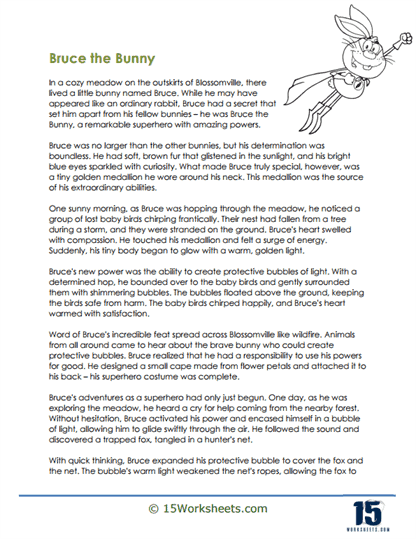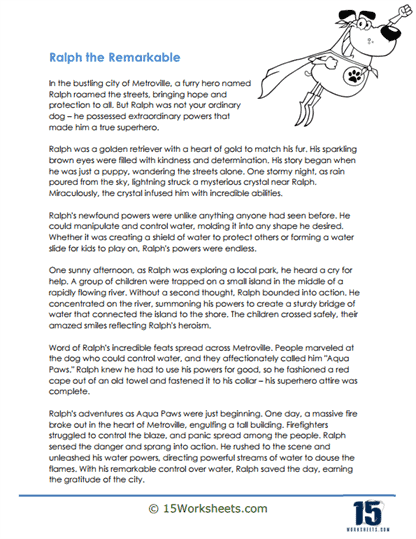Superhero Worksheets
About These 15 Worksheets
Superhero worksheets are educational tools that use the engaging theme of superheroes to enhance learning, particularly in the area of language arts. These worksheets incorporate various activities related to superheroes to make learning more appealing and relatable for students. By integrating characters and narratives from the superhero genre, these worksheets can significantly boost engagement and motivation in students, making the learning process more enjoyable and effective.
By tapping into the popular and exciting world of superheroes, these worksheets make learning more engaging and relatable, leading to improved reading comprehension, writing skills, vocabulary, grammar, and critical thinking. The wide range of activities available caters to different learning styles and interests, ensuring that all students can benefit from these creative educational tools. Regular use of superhero worksheets in the classroom or at home can significantly contribute to a student’s language arts development, setting a strong foundation for academic success and lifelong learning.
Types of Exercises
Reading Comprehension Exercises – These involve reading passages about superheroes or superhero-themed stories, followed by questions to assess comprehension. Enhances reading skills, improves understanding of text structure, and builds vocabulary.
Creative Writing Prompts – Prompts asking students to write their own superhero stories or create dialogues for superhero characters. Fosters creativity, improves writing skills, and encourages imaginative thinking.
Vocabulary Activities – Worksheets focused on teaching new words through superhero-themed contexts, like descriptions of powers or characteristics. Expands vocabulary and helps in learning the application of new words in different contexts.
Grammar and Punctuation Exercises – Activities where students correct grammatical errors in sentences about superheroes or add appropriate punctuation in superhero comic strips. Reinforces grammar rules and the correct use of punctuation.
Character Analysis – Activities that involve analyzing the traits, motivations, and development of various superhero characters. Enhances analytical skills and deepens understanding of character development.
Story Sequencing and Plot Analysis – Exercises that ask students to sequence events in a superhero story or analyze the plot structure. Develops narrative understanding and sequencing skills, and fosters an appreciation of storytelling elements.
Persuasive Writing Tasks – Assignments where students write persuasive pieces, such as arguing who the best superhero is or persuading others to read a superhero comic. Improves argumentative writing skills and the ability to support opinions with evidence.
Superhero Biographies and Profiles – Worksheets where students create biographies for superheroes or write profiles based on given information. Teaches informational writing and how to organize facts in a coherent manner.
Comparative Analysis – Activities that involve comparing and contrasting different superheroes or superhero stories. Develops critical thinking and comparative analysis skills.
Dialogue and Script Writing – Writing exercises where students craft dialogues for superheroes or script scenes for a superhero play. Enhances dialogue writing skills and understanding of script formats.
Journaling from a Superhero’s Perspective – Journaling activities where students write entries from the perspective of a superhero character. Encourages empathy, perspective-taking, and reflective writing.
Improving Language Arts Skills
Enhancing Reading Comprehension – Superhero worksheets with reading passages help improve students’ reading comprehension, a fundamental skill in language arts. The engaging content motivates students to read more attentively.
Boosting Writing Skills – Creative writing exercises based on superheroes encourage students to write more and improve their narrative, descriptive, and argumentative writing skills.
Expanding Vocabulary – Learning new words in the context of superheroes makes vocabulary building more engaging and memorable for students.
Reinforcing Grammar and Punctuation – The use of superhero-themed sentences and stories makes grammar and punctuation practice more appealing, leading to better retention and understanding of these concepts.
Developing Analytical and Critical Thinking – Character analysis and plot dissection exercises cultivate students’ analytical skills, teaching them to think critically about characters, motivations, and story structures.
Fostering Creativity and Imagination – Writing and journaling tasks that involve superheroes spark creativity and imagination, key components of effective language arts skills.
Improving Persuasive Writing – Persuasive writing tasks related to superheroes help students practice structuring arguments and presenting evidence, essential skills in persuasive and argumentative writing.
Teaching Narrative Structure and Sequencing – Story sequencing and plot analysis tasks help students understand narrative structure, an important aspect of reading and writing stories.
Encouraging Engagement and Participation – The superhero theme can significantly increase student engagement, leading to more active participation in language arts activities.
Cultivating Empathy and Perspective-Taking – Journaling from a superhero’s perspective helps students understand different viewpoints and develop empathy, enhancing their emotional intelligence and writing depth.





















